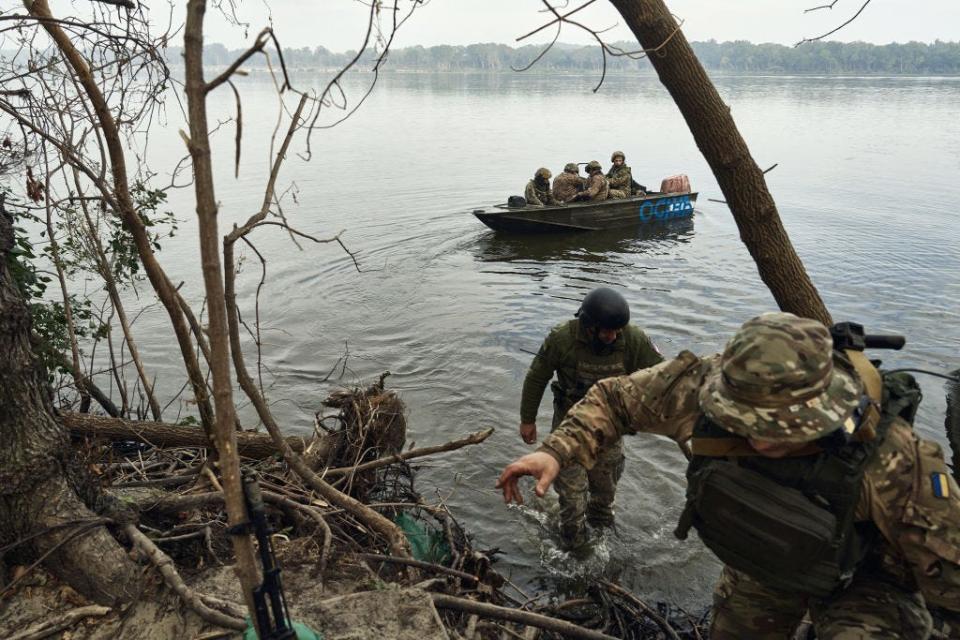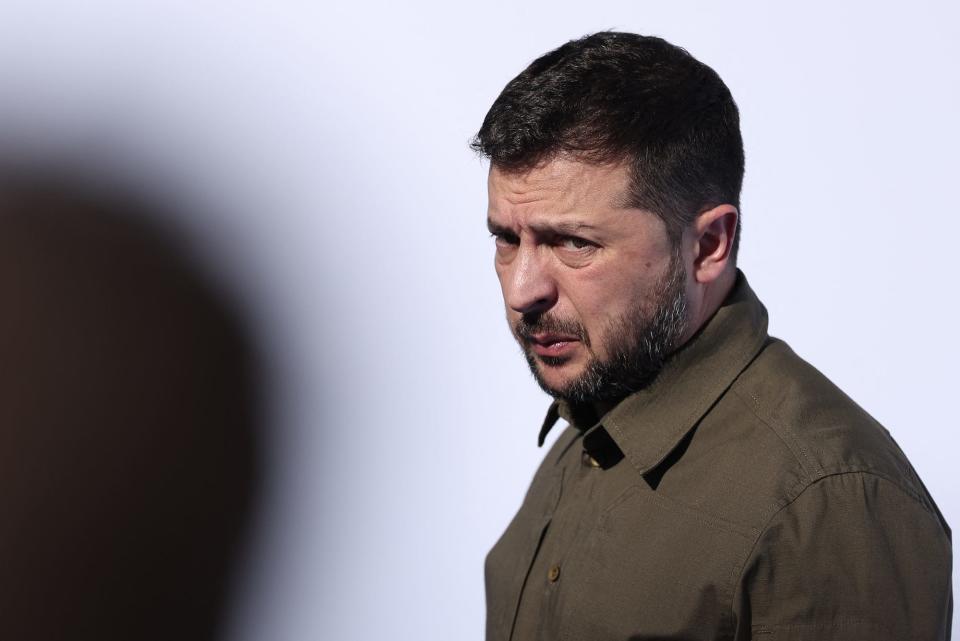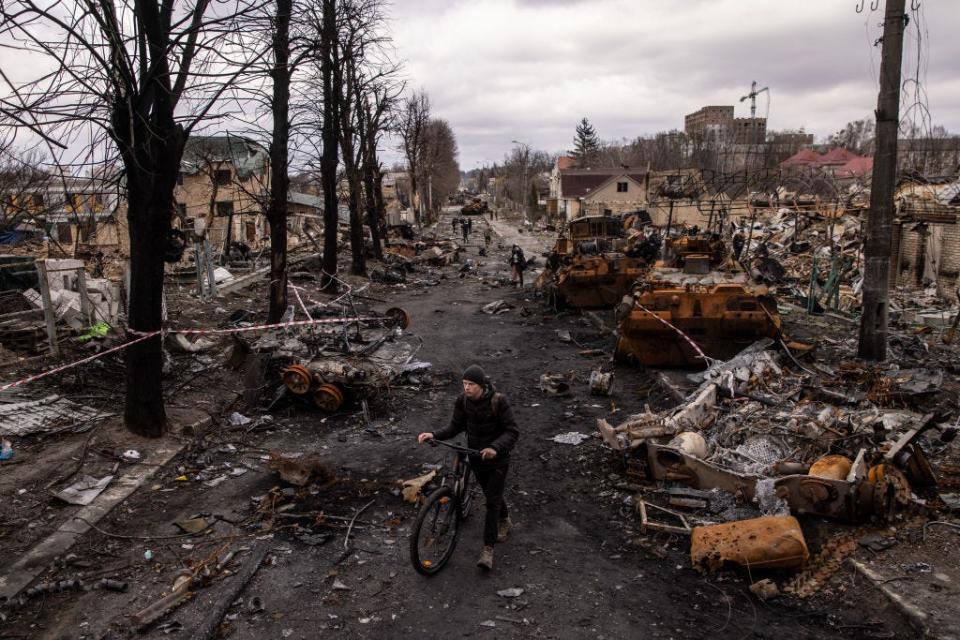-
Ilya Ponomarenko is one of Ukraine’s best-known war reporters.
-
He has been reporting on the Russia-Ukraine conflict since the annexation of Crimea in 2014.
-
His book “I Will Show You How It Was: The Story Of Wartime Kyiv” will be published on May 7th.
Illia Ponomarenko grew up in the city of Volnovakha in the eastern Donetsk region of Ukraine. He was a student at Mariupol State University in 2014 when war broke out in Donbass and Russia annexed the Crimean peninsula.
Ponomarenko told Business Insider: “We were patriotic, we were enthusiastic. We felt that the country was in our hands and we wanted to make this country a better place after the revolution,” pro-Russian President Viktor Yanukovych in 2014.
Although Ponomarenko, 32, said he was medically unable to serve in the Ukrainian military himself, he still wanted to help, so he grabbed a notepad and pen and began reporting on the war.
Ponomarenko visited the front countless times, initially reporting for a local newspaper in Volnovakha before joining the Kiev Post. In 2021 he will co-found the Kyiv Independent.

He said he had survived a number of close calls in recent years, including “the most dangerous two hours” of his life in May 2017 during a Russian mortar attack on Avdiivka.
Almost five years later, during the Russian siege of Kiev, a tank shell hit the apartment building where he was living at the time.
Nevertheless, Ponomarenko did not flee. Rushing to report from the front was never a choice, he said, but rather a “duty” he had to fulfill.
Since Russia’s full-scale invasion in February 2022, Ponomarenko has become one of Ukraine’s best-known journalists, with around 1.2 million followers on X, formerly Twitter.
His contributions provide an insight into the man himself: harsh, determined and full of humor.
His first tweet after the Russian invasion: “This is it folks. See you in victorious Ukraine.”
That’s it, folks.
See you in victorious Ukraine.— Illia Ponomarenko 🇺🇦 (@IAPonomarenko) February 24, 2022
“War makes people reveal their true selves”
Ponomarenko had the chance to leave Ukraine after Russia began its invasion.
He rushed to his girlfriend’s parents’ house near the border with Moldova with his girlfriend Natalya, a few of his friends and his mother, who had still been living in Volnovakha when the Russians crossed the border.
But something was wrong with him. “I am a war reporter,” he writes in the new book “I Will Show You How It Was,” due out May 7. “I have to be with my military now.”
A few days later he returned to Kiev, where Russian troops were rapidly advancing.
“It was the best and most right decision of my entire life,” he told BI. “I refused to make a deal with the devil. I followed my conscience.”
Ponomarenko said he believes the war “showed what ordinary people are capable of” and helped reveal “their true selves,” pointing to Ukrainian President Volodymyr Zelensky as evidence of this.
He said he had always been somewhat skeptical about the Ukrainian leader’s motives for becoming president and his behavior in office, considering him something of a showman.
But he said the war brought out the best in Zelensky and made him a leader.
He added that the war also had a clear impact on his mother, who was staunchly pro-Russian before the invasion.
“She was among so many pro-Russian people who saw what they needed to see,” he said.


Ukraine is suffering heavy losses on the Eastern Front but is not yet out of the fight, he said
Ukraine has suffered a series of serious setbacks on the Eastern Front in recent months.
In February, as the war entered its third year, Ukrainian troops withdrew from the war-torn town of Avdiivka, a key base defending the country’s logistics center in Pokrovsk.
Since then, Russia has continued to advance in the surrounding areas.
Last week, a Ukrainian blunder allowed Russian troops to advance and capture large parts of Ocheretyne, a village northwest of Avdiivka, while the battle for Khasiv Yar, another key town in the Donetsk region, also rages on.
The capture would bring Russian forces within striking distance of Ukrainian operations and supply centers in the region.
Ponomarenko told BI the situation was “catastrophic.”
“The six months of chronic, acute shortages of defense assistance, critical shortages of ammunition and manpower – the Russians are seizing that momentum,” he said.
But he added: “It’s not an apocalypse. We’re still in the game.”
Kyiv and Bucha: symbols of hope
Ponomarenko believes that part of the problem is that Ukraine has lost the sense of unity and togetherness that it had in the first months of the war – “the anger of the damned,” as he calls it.
“All ethnic, religious or social boundaries disappeared. A worker could stand next to a minister,” Ponomarenko writes in the book.
But after more than two years of hard struggle, “of course the situation is different today,” he added. “The large-scale mobilization has significantly affected public morale.”
Ukraine needs “a bit of the spirit of the Battle of Kiev, that burst of patriotism and enthusiasm,” he said. “It was a shining moment of pure bravery and hope.”


Ponomarenko now lives with his girlfriend in Bucha, which became known worldwide due to the atrocities committed by Russian troops.
The journalist recalled the first time he visited the city after Russia left it, noting that a “feeling of evil” and a “smell of death” permeated the streets.
Human corpses, limbs and dead dogs lay scattered on the ground. It was a “hellish landscape,” he said.
At the time, some were convinced Bucha would never recover, but returning citizens have helped revitalize the town with the help of a donation from the son of billionaire investor Warren Buffett.
Now Ponomarenko said he can smile when he thinks of the city’s peaceful streets, its blooming flowers and people walking in its parks.
“Bucha was the greatest moment for me because it shows that life wins,” Ponomarenko said. “Life always wins if you just keep fighting.”
Read the original article on Business Insider
